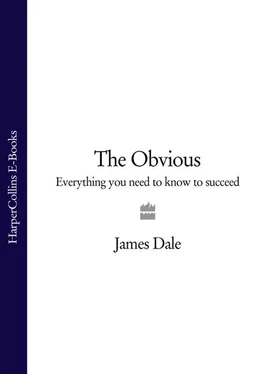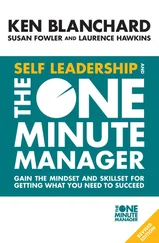JAMES DALE
THE OBVIOUS
Everything you need to know to succeed

To my wife, Ellen. I was going to make a list of all the things you mean to me, but the publisher said I had to leave room for the book. I love you. Obviously.
Cover
Title Page
Dedication
Introduction
Part I – Work is a verb
The bottom is a good place to start
There are no shortcuts
Work is a challenge. Or it should be.
Part II – It’s not about you
It is about everyone but you
Go on an ego diet
The credit will find you
Part III – Don’t be a jerk. Be reasonable, kind, decent, fair – in a word – nice.
There’s something to this Golden Rule thing
The bad guys make the good guys look better
Play fair – what a concept
You’re judged by the company you keep
Part IV – Listen more than you talk
Shut up
Listen. Then hear.
You can learn a lot from great listeners. And bad ones.
It’s okay to be ignorant. It’s not okay to stay that way.
Ask. It’s a great way to find out what you don’t know.
Part V – Every job is sales
Don’t sell. Solve.
Give people what they want (not what you want them to want)
Buying is selling
The customer is always right … even when she’s wrong
Part VI – Simple is better than complicated
You can see more clearly from a distance
Ahem. Pay Attention.
Throw out your mental trash
Part VII – Less is more
Extra long is for suits, not meetings
Don’t write in ink (50% of all meetings get changed)
Cut the budget
Cut your losses
Part VIII – Say what you mean
It’s more important to do business than to speak business
A weasel is a rodent
Mean what you say
Part IX – Honesty – the most oowerful weapon in business
There’s no such thing as a good liar
An excuse is not a reason
Apologize
Take responsibility
Part X – Open your mind – let ideas in
Whatever you think, think the opposite
Failure is good
Change happens
Global is the new local
Just because someone is rich doesn’t make him smart
You have to get old. You don’t have to think old.
Part XI – Reality – deal with it
Life isn’t fair. Get over it.
Consistency beats a hot streak every time
Don’t look backward. There’s nothing there.
Most things aren’t as serious as they seem (but some are)
Part XII – Don’t keep score
Envy is ugly
Grudges are stupid
Forgive and forget – or at least one out of two
Ignore titles, especially your own
Money is a tool, not a god
It’s 0–0 tomorrow
Part XIII – Energy – the unfair edge
Show up
Today is a good time to do something
Obsessive–compulsive isn’t all bad
Patience is a virtue. So is impatience.
Don’t take “no.” Press “0.”
Work is not a hobby
Part XIV – Imagine you worked for you
Be the boss. Don’t be bossy.
Take Boss 101. Learn from best and worst.
Hire someone smarter than you
Promote someone who isn’t ready
Trust someone – besides yourself
Firing hurts – or it should
Everyone has a boss – even the boss
Part XV – Take inventory
If you wait for things to be different, you’re in for a long wait
If you have to ask for a raise, quit
Start over tomorrow – but don’t do it the same way
Copyright
About the Publisher
The secrets to successin business aren’t secrets at all. They’re beliefs, ideas, values, and strategies most of us already know, but ignore. Tell the truth. Share the credit. Listen more than you talk. Open your mind . They’re in plain sight, staring us in the face, fundamental and familiar – in a word, obvious. Maybe too obvious. They’ve been recited to us by our parents and grandparents. Words to live by. As likely to appear in a fortune cookie as an MBA textbook. In fact, they are so fundamental, they may have been taken for granted or ignored, and certainly not practiced to their highest effect.
They’re simply obvious. Not tricky, sly, clever, or even complicated. Just proven effective, over and over, irrefutably. Not in a hypothetical case or historic analogy or cute parable, but in real life, in real deals, in real business. They work. Regardless of the field of business – from airlines to biotech to apparel to building to marketing to shipping to demolition to design to wholesale to retail to service to security to insurance to entertainment. Regardless of the job – from sales rep to department head to regional manager to HR to CFO to CEO. Same principles, same results, always effective.
If they’re obvious and they work and we’re already familiar with them, why do we ignore them? Maybe because human beings have a weakness for tricks, gimmicks, and schemes – shortcuts to the pot of gold – anything but the obvious. Maybe because we haven’t treated The Obvious with same respect as we treat shortcuts. Maybe because we’ve never looked at The Obvious closely enough to see not only how effective they are, but why, and how best to use them. Maybe they haven’t been assembled and explained in one place where we could see how compelling they are, individually and especially, together.
Here they are. The Obvious, a collection of the principles – beliefs, ideas, values, and strategies – that work. Where did they come from? The best sources on earth. From historians, story-tellers, moralists, famous minds like Ben Franklin and Woody Allen, humble minds like our grandparents and parents, from real life, from fairy tales, and from experience, the wisest teacher of all. Their efficacy has been proven; their potency has rarely been realized; they are effective immediately. Every new self-help book would have us believe they’ve discovered the new secret formula for success. It’s not new; it’s not secret; and it’s not a formula. It’s old; it’s well-known; and it’s all here. The Obvious – all assembled in one book, divided into logical categories, explaining why each principle is obvious, how and why it works, and how you can use it. They’re all you need to know. Period.
Part I WORK IS A VERB
Work means, literally, “to exert oneself.” Work is hard. It’s demanding, frustrating, stressful, complicated, challenging, even exhausting. It’s heavy lifting, for the body and the mind. No wonder a lot of people don’t like to do it. Or would rather rationalize why they didn’t, can’t, or won’t do it. Who wouldn’t rather point the remote control at the TV?
We live in a world that has named and rationalized virtually every shortcoming and excuse, inside and outside the workplace. People can’t just be lazy. They must be under-challenged, distraction-prone , or decision-averse . Which leaves a lot of work un-done. Which creates enormous opportunity for anyone willing to do it. And reward.
Work is a verb. It’s an action – not an observation. Get to it.
The bottom is a good place to start
Читать дальше













